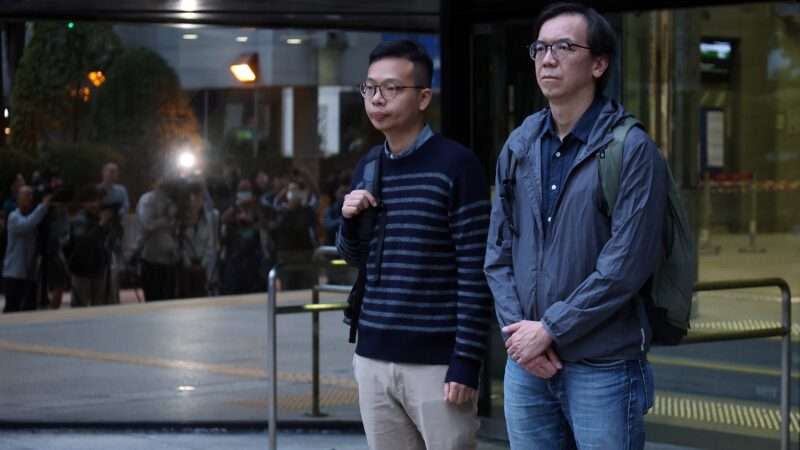
Chung Pui-kuen and Patrick Lam were convicted last week by Hong Kong District Court Judge Kwok Wai-Kin on charges of "conspiracy to publish and reproduce seditious publications," per NPR. The charge of sedition includes "inciting hatred or contempt against the Chinese central government [and] the Hong Kong government." Following their convictions, the two journalists each face a maximum of two years in prison and a fine of HK$5000 (or $640).
Pui-kuen and Lam, the former editors in chief of Stand News, which shut down following a 200-officer police raid in December 2021, had charges brought against them in October 2022 for 17 articles published from July 2020 to December 2021. Prosecutors alleged these articles, including "opinion pieces criticizing the national security law" and "interviews with former pro-democracy lawmakers," promoted "illegal ideologies" and smeared the 2020 National Security Law (NSL) during the 2019 protests.
Hong Kong's pro-democracy protests were prompted by the Hong Kong Security Bureau's proposed amendments to extradition laws, which would enable Chinese extradition of Hong Kongers, in February 2019. In response, thousands took to the streets in March of that year and over half a million followed suit in June. On October 23, 2019, the extradition bill was withdrawn, but this victory for Hong Kong's freedom was short-lived. In May 2020, Beijing announced it would impose the NSL on Hong Kong. The Chinese parliament approved the measure on May 28, and a month later, the law went into effect.
Jimmy Lai, the billionaire founder of clothing retailer Giordano and founder of the newspaper Apple Daily, was arrested in August 2020 under the NSL for "collusion with foreign forces," to which Lai pleaded not guilty. Lai is currently being held in solitary confinement.
Then, in June 2021, Apple Daily was raided under the NSL. Five editors were arrested for "'use of journalistic work' to incite foreign forces to impose sanctions on Hong Kong and China," according to the Associated Press, citing Hong Kong Security Secretary John Lee. Following the 500-officer raid, Apple Daily shut down for good.
Other courageous pro-democracy voices have faced even stricter punishment under Chinese jurisdiction. Yang Hengjun, a Chinese-Australian writer, academic, and former employee of China's Ministry of State Security, was convicted of espionage in a closed-door hearing in May 2021. Hengjun's death sentence was commuted to life in prison this February, following a two-year probationary period.
Francis Lee, a journalism professor at the Chinese University of Hong Kong, tells NPR that last week's ruling against Pui-kuen and Lam extends the definition of smearing to include speech critical of the government. In the wake of the ruling, Eric Chan, Hong Kong's chief secretary for administration, said there would be no restrictions on freedom of speech if "journalists conduct their reporting based on facts." Apparently these facts do not include those inconvenient to the government.
The law invoked to prosecute Pui-kuen and Lam is a holdover from Hong Kong's British colonial era that had not been invoked since the nation was brought under Chinese control in 1997. The British origin of the sedition law is bitterly ironic: Lai credited the British with giving "us the institutions of freedom….Rule of law, free speech, and the free market." Given the U.K.'s unimpressive record on free speech, the law's British provenance is not terribly surprising.
As if speech were not sufficiently curtailed in China and Hong Kong by the NSL and the British sedition law, the Article 23 law, a.k.a. Safeguarding National Security Ordinance, was signed into law unanimously in March of this year. Article 23 "expands the crime of sedition…and raises the maximum punishment from two years in prison to 10," according to NBC News.
In a letter to the court, Lam wrote that "journalists do not have to be loyal to anyone….If we have any true allegiance, it is to the public and only the public, because we believe in freedom of the press and freedom of speech." In an earlier display of courage, Lai said he was "happy" to have "[gotten] into trouble" for standing up for what's right because "if we just surrender…we will lose the rule of law. Lose the freedom." Despite the best efforts of Lai, Pui-kuen, and Lam, Hong Kong has become less free.
The post Is Free Speech Doomed in Hong Kong? appeared first on Reason.com.







